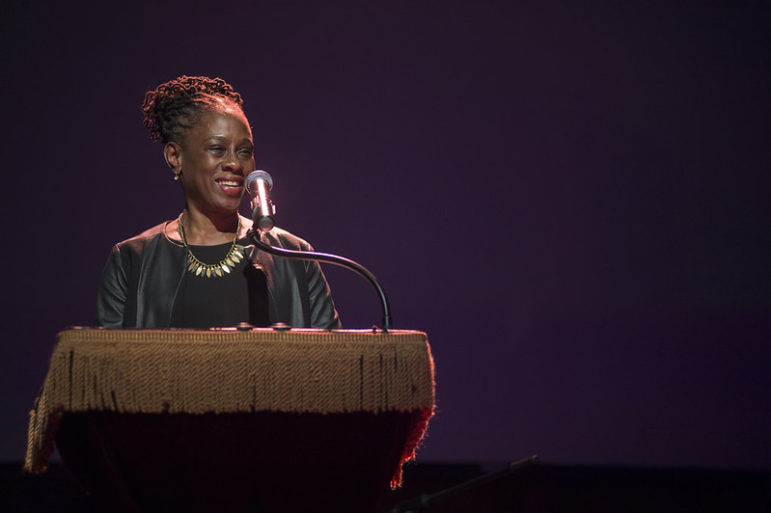Public pronouncements about effort to expand MWBE assistance didn’t mention the 1.2 million-member population group.

Ed Reed/Mayoral Photography Office
First Lady Chirlane McCrayRead the original story at Sing Tao Daily.
Translated by Rong Xiaoqing from Chinese.
When Mayor de Blasio signed an executive order at the end of July to launch programs helping women and minority-owned businesses enterprises (MWBE), City Hall sent out a press release noting that Black and Latino entrepreneurs are whom the programs mean to benefit. Asians whose businesses have been hit hard during the pandemic but are left out were furious.
On the 27th, when First Lady Chirlane McCray and the city’s taskforce on racial inclusion and equity executive director Sideya Sherman hosted a roundtable for community and ethnic media to discuss the city’s “supports for entrepreneurs of color,” the press advisory once again highlighted Black and Latino businesses without mentioning Asians. When asked about this exclusion, the First Lady apologized for what she called a “language disconnect” and promised to make a change.
While the mayor’s executive order meant to help MWBEs grow their businesses and get more government contracts, the press release clearly stated that the programs were “to connect Black and Latino entrepreneurs to business opportunities,” “identify a subset of Black and Latino certified firms and match them to contracts,” and “help Black and Latino communities to create online and in person mentorship networks.”
The exclusion immediately triggered an outcry in the Asian community. “We are sick and tired of constantly having to remind this administration that we exist,”Councilmember Peter Koo, who represents Flushing, tweeted right after the press release was sent out. And Justin Yu, president of the Chinese Consolidated Benevolent Association (CCBA), a major Chinese community organization, sent a letter to the mayor the day after, questioning the neglect. He said many Asian-owned businesses started suffering in January because of the rumors about confirmed COVID 19 cases in the community. Many of them are still not open yet, and some have closed for good.
“I urge you to revisit your plan and distribute the resources among minority groups equally,” Yu said in the letter. “Asian Americans have contributed a lot to New York City, and we must be included to receive resources and benefits fairly along with other ethnic groups.”
Xiaomin Zhao, a senior community liaison at the Mayor’s Community Affairs Unit, answered the inquiry this reporter sent to the mayor’s press office by saying the programs indeed include Asians, and the language was due to a misunderstanding by the press office. “Because the words ‘Black and brown’ were used in the press conference, the press office thought the programs meant only for Black and Latinx businesses,” she said.
However, less than a month later, the same glitch reoccurred. Under an innocuous subject stating the First Lady’s roundtable was to “discuss citywide supports for entrepreneurs of color,” the press advisory spelled out the focus in its text: “ to discuss steps the City is taking to help Black and Latinx entrepreneurs grow their businesses.”
When she was asked whether this was another “misunderstanding” or a confirmation that supports were indeed only to benefit two of the three minority groups, First Lady McCray admitted there is a “disconnect in terms of language.” She explained that the MWBE program was started by former Mayor David Dinkins to help minorities and women, but White women became the major beneficiaries in the years that followed. During the pandemic, Black and Latino communities are hit hardest, she indicated, but the mayor launched the new programs to help those who have the most need, including the Asian community. “Our language has not adjusted appropriately to reflect that,” she said.
McCray said this was the first time the problem was brought up to her and said she will make sure the entire press office to update the language. “I apologize for that. It’s something we all have to work on. It is not intended to keep Asian folks out.”
When Dinkins, the first Black mayor of the city launched the MWBE program in 1992, the population of Asians was much smaller than today, and the goal of the program, which was to offer Black and Latino entrepreneurs a certain share in city contracts. Mayor Guiliani rescinded the program, claiming it was unfair to White male entrepreneurs. After doing a survey about the share minority and women owned businesses obtained in city contracts, Mayor Bloomberg relaunched the program in 2005 with more detailed procurement goals guarded by a local law. (City Limits investigated flaws in the Bloomberg program back in 2013).
But unlike other minorities, Asians didn’t get a goal in most procurement categories. The Asian community was not happy. But the law was based on the result of the survey which didn’t find Asian entrepreneurs underrepresented in most of the procurement categories. The community realized the misperception was because that many eligible Asian MWBEs were not certified, a necessary step to do business with the city. Since then, community organizations have been working hard to help businesses become certified. In 2015, when the de Blasio administration did the survey again to adjust the procurement goals of the program, some Asians were appointed to the advisory committee.
Nowadays, most city procurement categories have set goals for Asian businesses.









3 thoughts on “First Lady Apologizes for MWBE Language Excluding Asians”
That’s OK. When de Blasio announced the Bush Terminal project on the Sunset Park waterfront in Brooklyn he forgot to invited the Asians, a major part of the local community and economy. Oops!
No that’s not ok. Did you read this article at all? It’s a slap in the face
If they really cared about Asians there would not have been an oversight. Systemic and Institutional Racism.